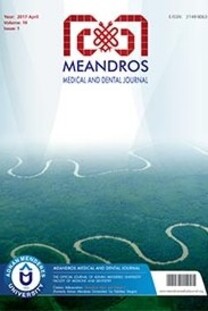A Case of Pneumomediastinum Due to Positive End-Expiratory Pressure
Kronik böbrek yetmezliği, genel durum bozukluğu ve solunum sıkıntısı ile acil servise başvuran 26 yaşındaki kadın hasta satürasyon problemi nedeniyle entübe edildi. Satürasyon düşüklüğü dışında genel kan biyokimyasında belirgin patoloji ayırt edilmedi. Olguda koroner arter hastalığı ya da kronik obstruktif akciğer hastalığı yoktu. Yoğun bakımda, pozitif ekspiryum sonu basınç (PEEP) tedavisi altındayken, ekokardiyografi (EKO) tetkikinde olgunun sağ kalp yetmezliği olduğu ve direkt grafi tetkikinde, yatışının 2. gününde akciğer grafisinde ve bilgisayarlı tomografi (BT) tetkikinde pnömomediyastinum tespit edildi. Düşük saturasyon için yapılan pozitif expirium sonu basınç (PEEP) tedavisi altında iken pnömomediastinum gelişmesi nadir bir durumdur. Olgunun bulguları eşliğinde tetkik verileri ve literatür bilgisi olgu sunumu olarak hazırlandı
Yüksek Pozitif Ekspiryum Sonu Basıncı Nedeniyle Oluşan Pnömomediyastinum Olgusu
A 26-year-old female patient, who presented to the emergency department with chronic renal failure, general condition disturbance and dyspnea, was intubated due to low oxygen saturation. The results of the blood biochemical test were normal except for low saturation. Our case did not have any coronary artery disease or obstructive pulmonary disease. While she was undergoing the positive end-expiratory pressure (PEEP) treatment in the intensive care unit, the patient was detected to have right heart failure on her echocardiogram examination and pneumomediastinum was found on her direct radiography examination and on chest x-ray and computed tomography (CT) on the 2nd day of her hospitalization. The development of pneumomediastinum associated with PEEP for low saturation appears to be a rare phenomenon. In accompany with the findings of the case, the examination data and the literature information were prepared as a case report
___
- Grossman W. Diastolic function and heart failure: an overview. Eur Heart J 1990; (Suppl C)11: 2-7.
- Mandinov L, Eberli FR, Selier C, Hess OM. Diastolic heart failure. Cardiovasc Res 2000; 45: 813-25.
- Ruzumna P, Gheorghiade M, Bonow RO. Mechanisms and management of heart failure due to diastolic dysfunction. Curr Opin Cardiol 1996; 11: 269-75.
- Zylak CM, Standen JR, Barnes GR, Zylak CJ. Pneumomediastinum revisited. Radiographics 2000; 20: 1043-57.
- Rigatelli G, Zanchetta M, Pedon L, Zennaro M, Maiolino P. Acute diastolic dysfunction due to pneumomediastinum following positive end expiratory pressure: a case report. Angiology 2004; 55: 441-3.
- Zkidkov KP, Bogatyr MN, Chezhin AN, Leiman VA, Smirnova OR. A case of respiratory distress syndrome complicated by the development of interstitial emphysema and pneumomediastinum. Anesteziol Reanimatol 2000: 62-4.
- ISSN: 2149-9063
- Başlangıç: 2000
- Yayıncı: Erkan Mor
Sayıdaki Diğer Makaleler
A Case of Pneumomediastinum Due to Positive End-Expiratory Pressure
ÖZLEM KOCATÜRK, Özüm TUNÇYÜREK, Fatma BAYRAK, Emine Meltem BULUT, Neslihan KARATAŞ
Erythrocyte Indices in Patients with Preeclampsia
SÜMEYRA NERGİZ AVCIOĞLU, SELDA DEMİRCAN SEZER, SÜNDÜZ ÖZLEM ALTINKAYA, MERT KÜÇÜK, İMRAN KURT ÖMÜRLÜ, HASAN YÜKSEL
SİNEM SARI ÖZTÜRK, FÜSUN EROĞLU, Pierfrancesco FUSCO, Tolga ATAY, Berit GÖKÇE CEYLAN
Deniz ŞİMŞEK, ÖZGÜR DENİZ TURAN, Ahmet Mete ERGENOĞLU, Halit Batuhan DEMİR, TAYLAN ÖZGÜR SEZER, ÇAĞDAŞ ŞAHİN
Burkitt Lenfomalı Bir Çocukta İzole Skrotal Deri Relapsı
Doğan KÖSE, Ali Sami KIVRAK, Serdar UĞRAŞ, YAVUZ KÖKSAL
